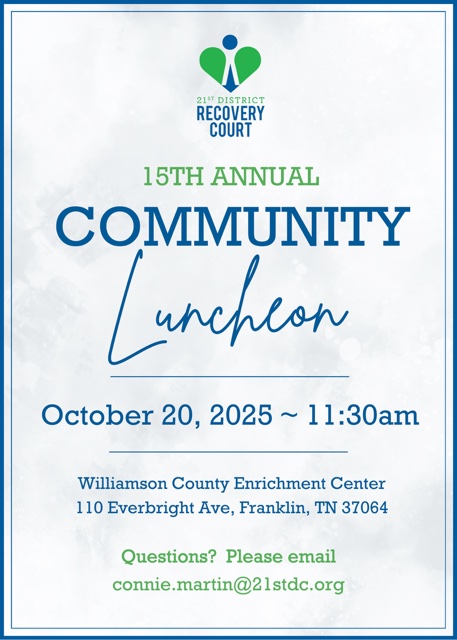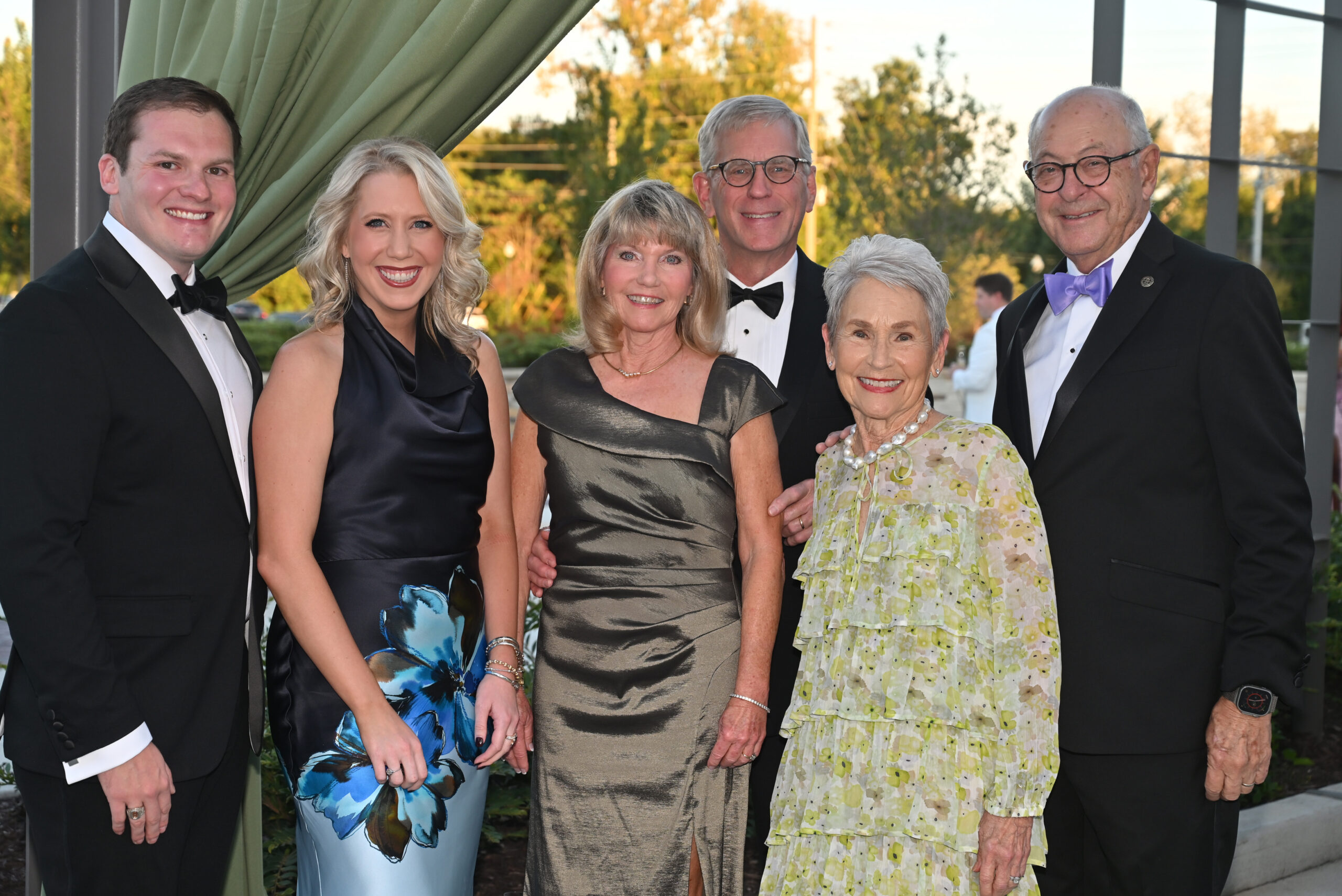21st District Recovery Court’s 15th Annual Community Luncheon to be held Monday, October 20

Past Board President, Lacie Simonton, to receive “Gayle Moyer Harris Award” for her commitment to Recovery Court’s mission to restore lives; Tennessean Columnist, Brad Schmitt to emcee and share his story of recovery, and also hear from a 21st District Recovery Court graduate
FRANKLIN, Tennessee – Oct. 3, 2025 – The 21st District Recovery Court (Recovery Court) Board of Directors is hosting their 15th Annual Community Luncheon on Monday, Oct. 20 at 11:30 a.m. at the Williamson County Enrichment Center located at 110 Everbright Ave. in Franklin.
The luncheon supports Recovery Court’s alternative sentencing program in the 21st Judicial District. Recovery Court allows local nonviolent offenders, who suffer from addiction issues, the opportunity to complete an intensive two-year, court-supervised recovery program instead of, or in addition to traditional sentences.
“Our program is not an easy way out,” said Program Director Connie Martin. “The court only considers applicants demonstrating a genuine desire to confront their addictions. Those that are accepted undergo rigorous treatment and intensive monitoring as they learn life skills and new habits for successful living. Our model is unique in that it uses a non-adversarial, therapeutic approach to crimes rooted in addiction.”

L-R: Past Board President, Lacie Simonton to receive “Gayle Moyer Harris Award”; Tennessean Columnist, Brad Schmitt to share his story of recovery and serve as luncheon emcee
The program’s emcee is Tennessean Columnist, Brad Schmitt, who will share his compelling journey from addiction to recovery. Past Board of Director’s President, Lacie Simonton, will be honored with the “Gayle Moyer Harris Award,” named after one of the Recovery Court’s founders, and a graduate of the program will share how the program transforms lives and restores families.
Luncheon participants will also learn how recovery courts are effective in reducing the revolving door of drug and alcohol related crime as well as reducing the cost to taxpayers. Recovery Court spends approximately $15,000 per participant annually compared to more than $40,000 to incarcerate each offender for a year. While each successful participant saves the county money, the program does not receive taxpayer funding from the counties. Recovery Court was established in 2002 under a three-year startup grant from the U.S. Department of Justice and is now funded primarily through grants and private donations. Recovery Court participants also pay modest participation fees every week. Since 2004, more than 376 participants have graduated from the two-year program.
The luncheon is free and open to the public, though reservations are encouraged. To RSVP online, click here. For more information visit, 21stdc.org or call 615.595.7868. Sponsorships are still available, visit 21stdc.org for more information, or for a direct link to the sponsorship packet, click here.
2025 Community Luncheon sponsors as of Oct. 2, 2025, include: Platinum Sponsors: Core Civic, Let It Shine Gymnastics, and Brett Warren; Table Sponsors: Jason and Allison Brown, Buerger, Moseley & Carson, PLC, Judge Timothy Easter, First Missionary Baptist Church, Don and Gayle Harris, Senator Jack Johnson, Larsen Law PLLC, Leadership Middle Tennessee, State Representative Jake McCalmon, David Robey, Wiatr & Associates, Nicole Wick, and Judge Joseph “Woody” Woodruff; Gold Sponsors: Cumberland Heights, FirstBank. Luncheon donors also include: Rogers, Shea & Spanos, PLLC. For those unable to attend, though wish to make a donation, visit: 21stdc.org.
###
About 21st District Recovery Court
The 21st Recovery Court serves the 21st Judicial District (Williamson County). Program participants are non-violent offenders with a history of chemical dependency, which has shown to be one of the primary reasons for repeated criminal activity. The program works with law enforcement and the courts as participants engage in a highly supervised, two-year program, providing treatment, supervision and support. Graduates of recovery court programs have a low rate of reoffending, especially compared to those offenders supervised in traditional court probation and parole programs. Participants’ recovery allows them to have a productive life while the community is served by a reduction in criminal activity and cost-effective treatment for offenders. Most importantly, the families and lives of the participants are restored to a safe and positive environment. Recovery courts in Tennessee are not supported by state judicial budgets, rather they are partially funded by a portion of statutory court costs paid by criminal offenders. For more information, visit 21stdc.org or call 615.595.7868.


